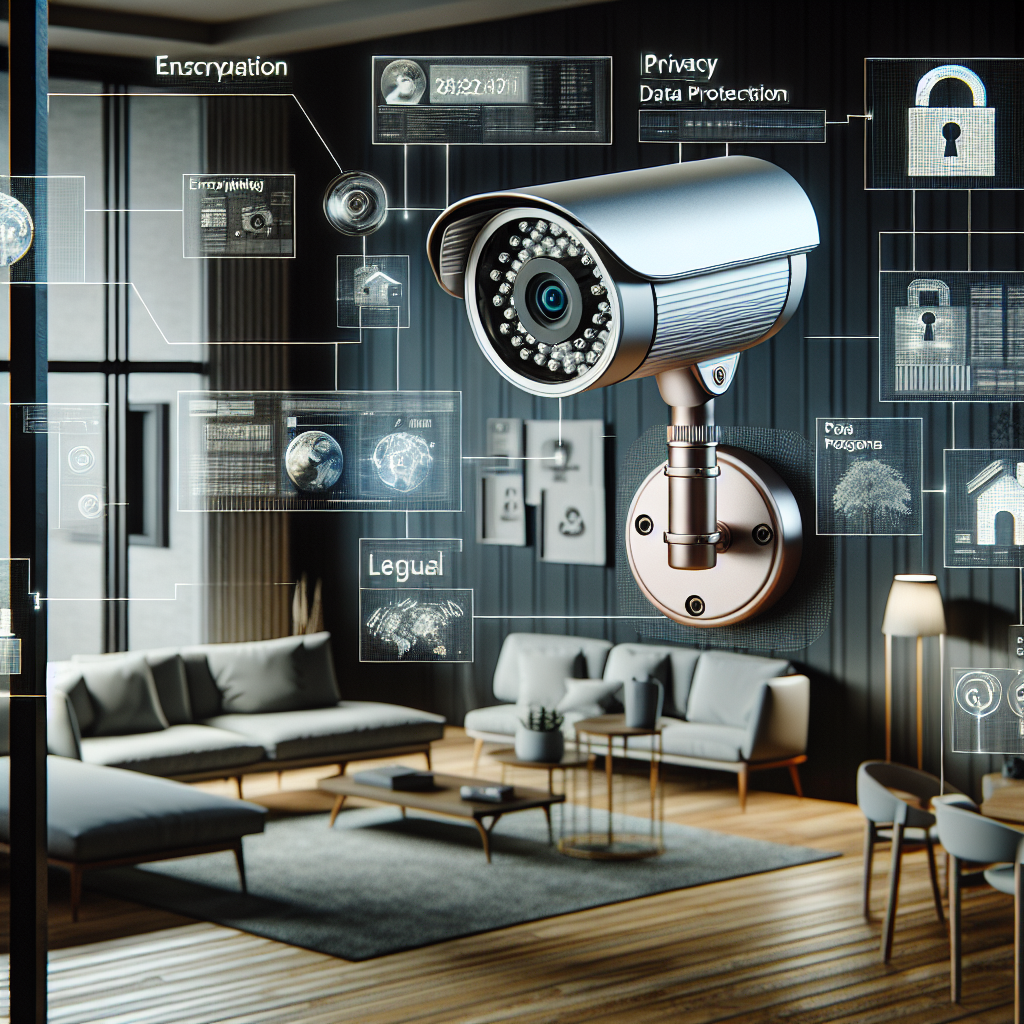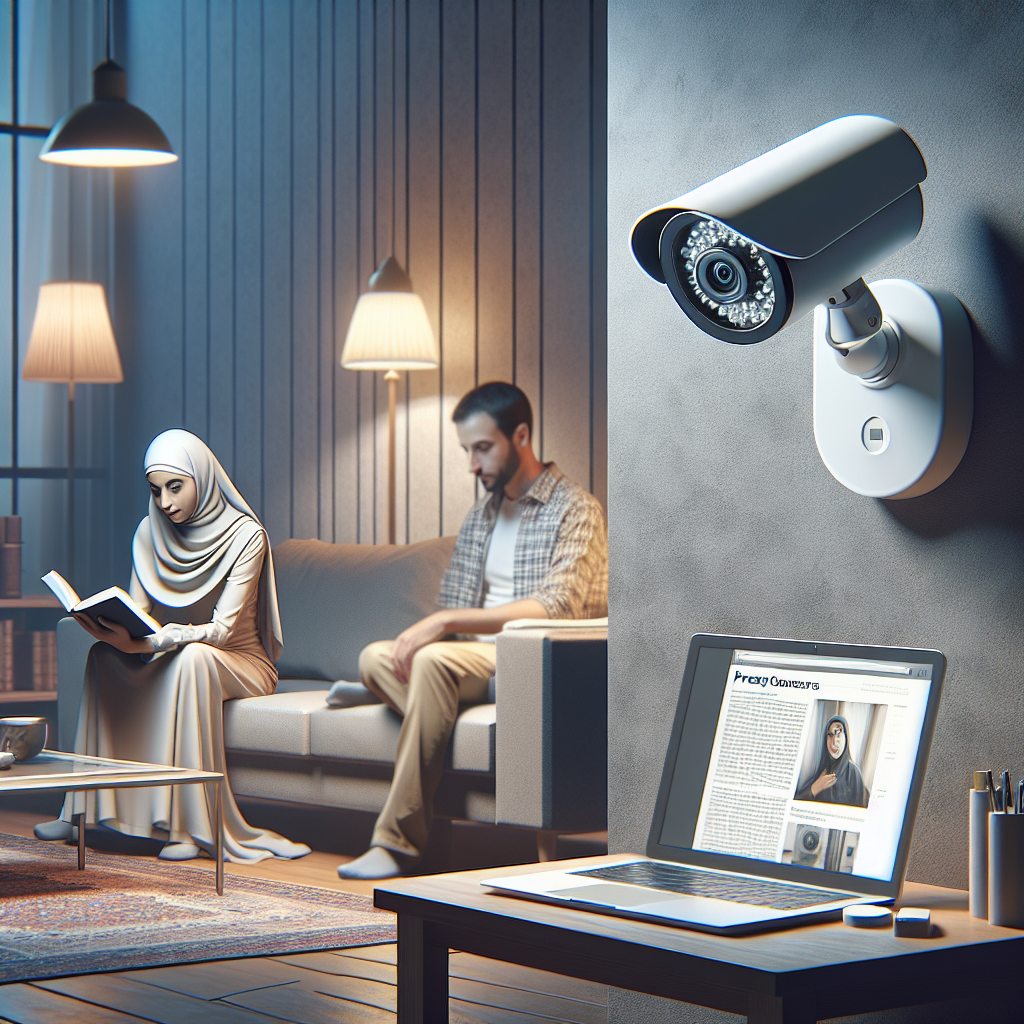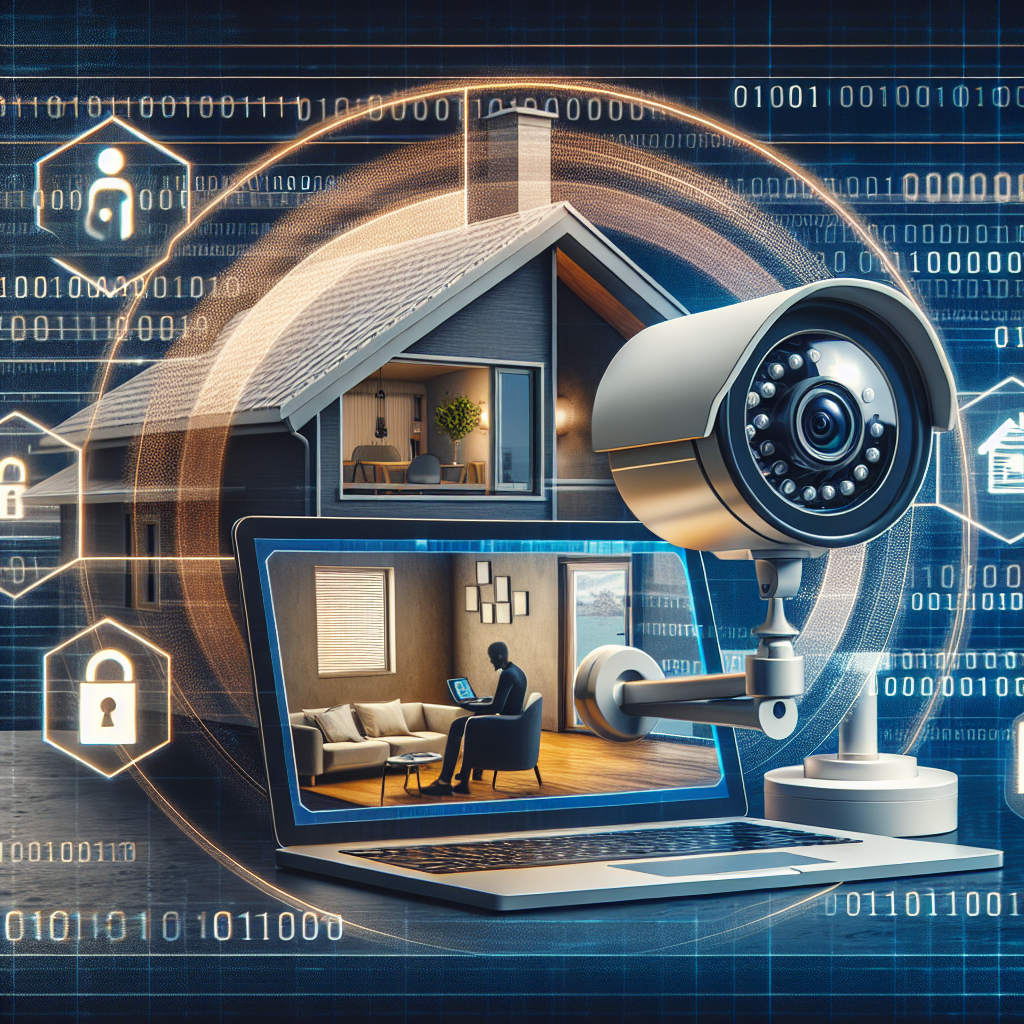In this modern age of technology, the rise of home security cameras has become increasingly prevalent, providing homeowners with a sense of safety and protection. However, with this convenience comes a new set of concerns regarding privacy. As these cameras monitor our homes around the clock, questions arise about who has access to this footage and how it may be used. From potential hackers to companies seeking to collect data, the intricacies of home security camera privacy concerns underscore the delicate balance between safety and surveillance. Join us as we delve into the complexities of this important topic and explore the implications for privacy in the digital age.
Understanding the Basics of Home Security Cameras

Home security cameras, also known as surveillance cameras, are electronic devices designed to monitor and record activities in and around a home. These cameras are typically connected to a recording device or a cloud-based service, allowing homeowners to access live or recorded footage remotely.
Definition of Home Security Cameras
- Home security cameras are sophisticated devices equipped with sensors and lenses to capture video footage.
- These cameras can be installed both indoors and outdoors to provide comprehensive surveillance coverage.
- The primary function of home security cameras is to deter potential intruders and provide homeowners with peace of mind by enhancing the security of their property.
Types of Home Security Cameras
- Indoor Cameras: These cameras are designed for monitoring the interior of a home and are commonly used to keep an eye on children, pets, or household staff.
- Outdoor Cameras: Outdoor security cameras are weatherproof and built to withstand various environmental conditions, making them ideal for monitoring the perimeter of a property.
- Wireless Cameras: Wireless security cameras connect to a Wi-Fi network, offering flexibility in placement and ease of installation.
- Wired Cameras: Wired cameras require physical cables for power and data transmission, providing a more stable connection but requiring professional installation.
Importance of Home Security Cameras in Modern Homes
- In an increasingly digital age, home security cameras play a crucial role in enhancing the safety and security of residential properties.
- With the rise of smart home technology, security cameras can be integrated with other devices, such as doorbell cameras and smart locks, to create a comprehensive home security system.
- The presence of security cameras can act as a deterrent to potential burglars and vandals, helping to prevent crime and protect the occupants of a home.
The Role of Home Security Cameras in Enhancing Safety and Security
Home security cameras play a pivotal role in bolstering safety and security measures for homeowners. These devices are designed to provide a sense of protection and vigilance by actively monitoring the surroundings. The following points highlight the specific functions that contribute to enhancing safety and security:
-
Deterrence of criminal activities: The mere presence of visible security cameras can act as a powerful deterrent against potential criminal activities. Intruders are less likely to attempt unlawful acts knowing that their actions are being recorded, thus reducing the risk of break-ins or vandalism.
-
Monitoring activities within and around the home: Security cameras offer real-time monitoring capabilities, allowing homeowners to keep a watchful eye on their property even when they are not physically present. This feature enables individuals to detect any suspicious behavior or unauthorized access promptly, enhancing overall security levels.
-
Providing evidence in case of security incidents: In the unfortunate event of a security breach or criminal activity, home security cameras serve as crucial sources of evidence. The footage captured by these devices can be instrumental in identifying perpetrators, understanding the sequence of events, and aiding law enforcement agencies in their investigations. This evidential support enhances the chances of apprehending offenders and seeking justice for any security-related incidents.
Privacy Concerns Surrounding Home Security Cameras
- Invasion of privacy for neighbors and passersby
Privacy concerns regarding home security cameras often revolve around the potential invasion of privacy for neighbors and passersby. Cameras positioned on residential properties may inadvertently capture activities or conversations of individuals in neighboring homes or public spaces. This intrusion can lead to discomfort and a sense of surveillance among those who are unknowingly being recorded. The lack of control over where the camera’s field of view extends raises significant ethical questions about the boundaries of surveillance in residential areas.
- Risks of hacking and unauthorized access
Another critical privacy concern associated with home security cameras is the vulnerability to hacking and unauthorized access. As these devices become increasingly connected to the internet and integrated into smart home systems, they also become potential targets for cyber attacks. If not properly secured, malicious actors could exploit weaknesses in the camera’s software or network connection to gain access to live feeds or stored footage. This breach not only compromises the homeowner’s privacy but also exposes sensitive information about daily routines, home layouts, and security protocols to external threats.
- Potential misuse of footage by homeowners or third parties
Moreover, the potential misuse of footage captured by home security cameras raises significant privacy considerations. While the primary intent of installing these cameras is often to enhance security and monitor property, there is a risk that homeowners may abuse the recorded footage for other purposes. This could include monitoring the activities of family members, guests, or service providers in a way that infringes upon their privacy rights. Additionally, there is a concern about the sharing or distribution of surveillance footage to third parties without consent, leading to the unintended exposure of individuals to unwarranted scrutiny or judgment. Such misuse highlights the complex ethical dilemmas surrounding the ownership and control of personal data captured by home security cameras.
Legal Implications of Using Home Security Cameras
In the realm of home security cameras, there exists a complex web of legal implications that individuals must navigate to ensure compliance with privacy laws and regulations. Understanding the legal landscape surrounding the use of these surveillance devices is crucial in safeguarding the rights of both homeowners and individuals captured on camera.

Laws and regulations regarding surveillance in residential areas
-
Video Surveillance Laws: Various states and countries have specific laws dictating the use of video surveillance in residential areas. These laws often outline where cameras can be placed, how recordings can be used, and the rights of individuals being recorded.
-
Consent Requirements: Some jurisdictions require explicit consent from individuals before they can be recorded on private property. Failure to adhere to these consent laws can result in legal consequences for homeowners.
-
Data Protection Regulations: In addition to video footage, the data collected by home security cameras may fall under data protection regulations, imposing obligations on homeowners to secure and handle this information responsibly.

Rights of individuals in relation to being recorded
-
Right to Privacy: Individuals have a fundamental right to privacy, even within the confines of their own homes. Homeowners must balance their security needs with respecting the privacy rights of neighbors and passersby who may inadvertently be captured on camera.
-
Access to Recordings: Laws may also govern who has the right to access recordings from home security cameras. Unauthorized access or sharing of footage can infringe upon the privacy rights of individuals and lead to legal disputes.
-
Redress for Privacy Violations: Individuals who believe their privacy rights have been violated by home security cameras may have legal avenues for seeking redress, such as filing complaints with data protection authorities or pursuing civil litigation against the homeowner.
How to ensure compliance with privacy laws when using home security cameras
-
Regular Compliance Audits: Homeowners should conduct regular audits of their home security camera setup to ensure it aligns with current privacy laws and regulations. This includes reviewing camera placements, data storage practices, and access controls.
-
Notification Practices: Informing individuals about the presence of home security cameras through visible signage can help demonstrate transparency and potentially fulfill legal requirements for consent in some jurisdictions.
-
Secure Data Handling: Implementing robust cybersecurity measures to protect the data collected by home security cameras is essential for safeguarding the privacy of individuals recorded on camera. Encryption, secure storage solutions, and access controls can help prevent unauthorized access to sensitive footage.
In conclusion, navigating the legal implications of using home security cameras requires a nuanced understanding of surveillance laws, privacy rights, and compliance measures. By staying informed and proactive in addressing privacy concerns, homeowners can strike a balance between enhancing their security and respecting the privacy of individuals within and around their homes.
Mitigating Privacy Risks Associated with Home Security Cameras
Home security cameras serve as valuable tools for enhancing safety and monitoring property, but their utilization raises significant privacy concerns that must be addressed. Mitigating these risks requires a multifaceted approach that encompasses various considerations and strategies. The following tactics can help minimize the potential privacy implications associated with home security camera systems:
-
Placement considerations to avoid capturing private spaces: One of the primary steps in safeguarding privacy when deploying home security cameras is thoughtful placement. Cameras should be strategically positioned to focus on designated areas such as entry points and outdoor spaces, while avoiding capturing areas where individuals have a reasonable expectation of privacy, such as bedrooms, bathrooms, or neighboring properties. By carefully selecting the locations for camera installation, homeowners can reduce the likelihood of inadvertently intruding on the privacy of others.
-
Securing camera feeds and data from unauthorized access: Protecting the integrity of camera feeds and stored data is essential for maintaining the privacy of individuals within and around the monitored premises. Implementing robust security measures, including strong passwords, multi-factor authentication, and regular software updates, can help prevent unauthorized access to camera systems. Additionally, utilizing secure networks and encrypted connections for transmitting camera footage can enhance the confidentiality of captured information and reduce the risk of interception by malicious actors.
-
Implementing privacy features such as encryption and access controls: Incorporating advanced privacy features into home security camera systems can further enhance their data protection capabilities. Encryption technologies can encode camera feeds and recordings, rendering them unintelligible to unauthorized entities attempting to intercept or view the content. Similarly, implementing access controls, such as user permissions and audit trails, can restrict the viewing and management of camera data to authorized individuals only, thereby limiting the potential for privacy breaches. By leveraging these privacy-enhancing features, homeowners can fortify the confidentiality of their security camera systems and mitigate the associated privacy risks.
Balancing Security Needs with Privacy Rights
In the realm of home security camera installations, striking a delicate balance between ensuring safety and respecting privacy rights is paramount. This equilibrium necessitates meticulous planning and thoughtful considerations to address the concerns of both security and privacy advocates. Here are some key points to keep in mind when navigating the complexities of this issue:
-
Importance of finding a middle ground between security and privacy: Homeowners must recognize the significance of creating a harmonious coexistence between maintaining a secure environment and safeguarding the privacy of individuals within and around their property. Striking a balance involves implementing security measures that are effective in deterring potential threats without compromising the privacy of innocent bystanders.
-
Communication with neighbors about camera placement and coverage: Open and transparent communication with neighbors regarding the installation and positioning of security cameras is essential in fostering a sense of community trust and cooperation. By discussing the scope of camera coverage and addressing any privacy concerns raised by neighbors, homeowners can proactively mitigate potential conflicts and ensure that their security measures do not encroach upon others’ privacy.
-
Seeking professional advice on optimizing security camera systems while respecting privacy boundaries: Consulting with security experts or professionals in the field can provide valuable insights into optimizing home security camera systems while upholding privacy boundaries. These experts can offer guidance on strategically placing cameras to maximize security coverage while minimizing intrusions into private spaces. By leveraging their expertise, homeowners can implement tailored security solutions that effectively protect their property without compromising the privacy of individuals in the vicinity.
FAQs: Exploring the Intricacies of Home Security Camera Privacy Concerns
What are some common privacy concerns associated with home security cameras?
Privacy concerns related to home security cameras often revolve around the potential for unauthorized access to footage, the risk of data breaches leading to the exposure of sensitive information, and the fear of being constantly monitored or surveilled in one’s own home.
How can I protect my privacy when using home security cameras?
To protect your privacy when using home security cameras, it is important to regularly update your camera’s firmware, use strong and unique passwords for all connected devices, enable two-factor authentication whenever possible, and carefully review the privacy settings and permissions on your camera’s mobile app to ensure that only authorized users have access to the footage.
Are there any laws or regulations that govern the use of home security cameras?
The laws and regulations surrounding the use of home security cameras vary by jurisdiction, but in general, it is important to familiarize yourself with local laws regarding video surveillance in residential areas, especially when it comes to issues of consent, notification, and the use of cameras that capture audio in addition to video.
What should I do if I suspect that my home security camera has been hacked?
If you suspect that your home security camera has been hacked, it is important to immediately disconnect the camera from your network, change all passwords associated with the device, and contact the manufacturer for guidance on how to secure your camera and prevent further unauthorized access to your footage. Additionally, you may consider consulting with a cybersecurity professional to assess the extent of the breach and take steps to enhance the security of your camera system.